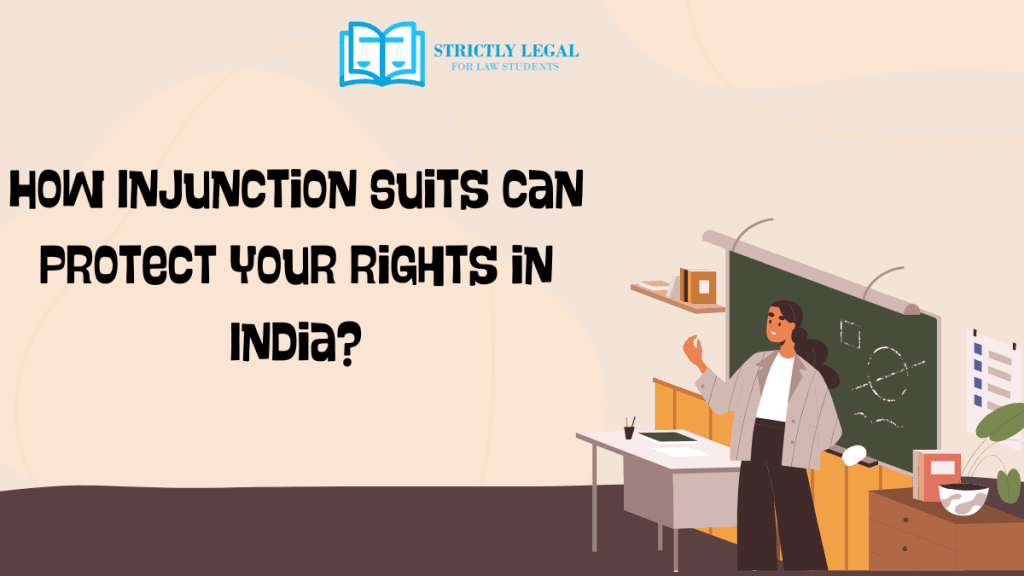In India, injunctions are essential for safeguarding the legal rights of people and organizations by averting injury or guaranteeing the performance of particular tasks. A court ruling known as an injunction compels a party to perform or abstain from performing a particular act. As part of civil litigation, injunction suits are frequently brought to protect rights, stop injury, and keep things as they are while a lawsuit is pending. People can effectively protect their rights by becoming aware of injunction suits.
Table of Contents
What is an Injunction?
An injunction is a judicial order that either restrains a party from performing a particular act (a prohibitory injunction) or compels them to do something (a mandatory injunction). Injunctions are a key part of equitable remedies, meaning they are used to ensure fairness and justice, especially when monetary compensation is insufficient or inappropriate.
Types of Injunctions in India
Injunctions can be categorized into three main types under Indian civil law:
Temporary Injunction:
A temporary injunction is granted for a limited period, usually to maintain the status quo until a final decision is made in the case. It is often used when immediate relief is needed to prevent harm or injury to a party’s rights before the case is fully heard. Order 39, Rules 1 and 2 of the Civil Procedure Code (CPC), 1908, govern the granting of temporary injunctions. For Example: Preventing the sale or transfer of a property during the pendency of a legal dispute over its ownership.
Permanent Injunction:
A permanent injunction is granted when the court finally decides the case and orders one party to refrain from doing something permanently or to carry out specific actions. It is issued after the conclusion of the case, based on a clear and definite finding of the party’s right to be protected. For Example: A permanent injunction preventing a construction project from encroaching on a party’s property after a legal dispute.
Interim Injunction:
An interim injunction is similar to a temporary injunction but is granted prior to the hearing of the case. It is issued to avoid irreparable damage or injury during the early stages of the litigation. For Example: Preventing the destruction of evidence or halting actions that might cause harm to the party’s interests.
When Can an Injunction Suit Be Filed in India?
An injunction suit can be filed in the following situations:
To Prevent Harm: If there is an imminent threat of harm to a party’s legal rights or interests, an injunction suit may be filed to prevent that harm. This could include preventing trespassing on property, illegal construction, or damage to goods.
To Preserve the Status Quo: Injunctions are often used to maintain the status quo until the court makes a final ruling. For example, if a party is about to change the conditions of a contract or property ownership, an injunction can be sought to prevent these changes.
To Ensure Compliance with Agreements: An injunction suit can be filed when one party refuses to comply with the terms of an agreement or contract. A mandatory injunction may be sought to compel compliance.
To Prevent Violations of Rights: When someone infringes upon a person’s legal rights, such as intellectual property rights (e.g., trademark infringement or copyright violation), an injunction suit can protect the rights of the aggrieved party.
Usual Scenarios where Injunction Suits may be filed
Intellectual Property Disputes: Injunctions are commonly used in cases involving the infringement of intellectual property rights, such as patents, trademarks, and copyrights. A person or company can file for an injunction to stop the unauthorized use of their intellectual property.
Property Disputes: In property-related matters, injunction suits may be filed to prevent illegal eviction, trespassing, or construction that violates property rights.
Family Law: Injunctions are sometimes used in family law cases, particularly in relation to the restraining of domestic violence, preventing the sale of family property, or enforcing child custody orders.
Consumer Protection: Injunctions can be sought to stop unfair trade practices, deceptive advertising, or the sale of defective goods.
Conclusion
Injunction suits in India provide an essential remedy for protecting legal rights and preventing harm before the resolution of a full civil suit. They are vital tools in ensuring fairness, preventing injustice, and preserving the status quo while litigation is ongoing. Whether it is to stop property disputes, enforce contracts, or safeguard intellectual property, injunctions serve as an effective means of protecting an individual’s or an entity’s legal interests in the civil law domain. Understanding when and how to seek an injunction can help individuals secure their rights and ensure that they are not subject to irreversible damage while legal disputes are resolved.

Law student.
Turning legal insights into engaging narratives.





